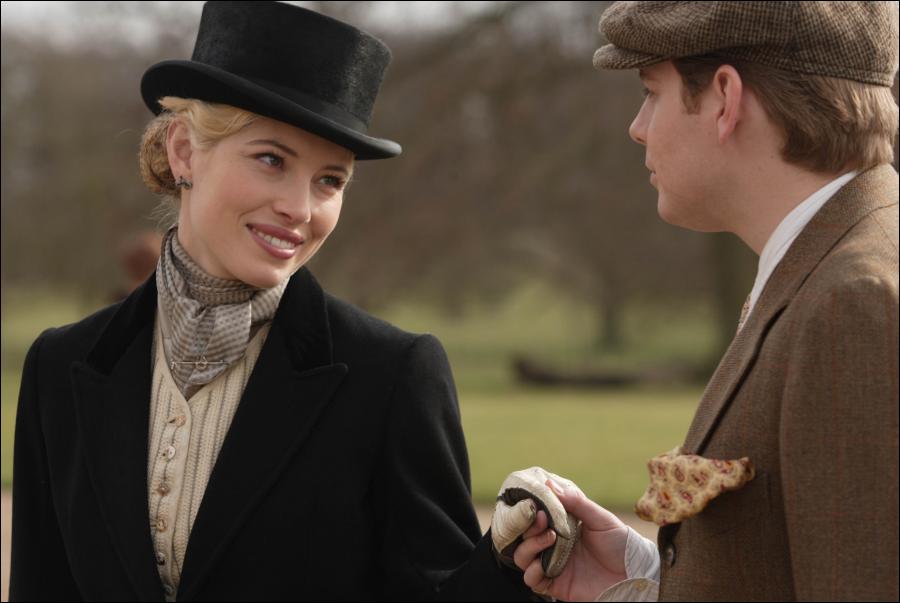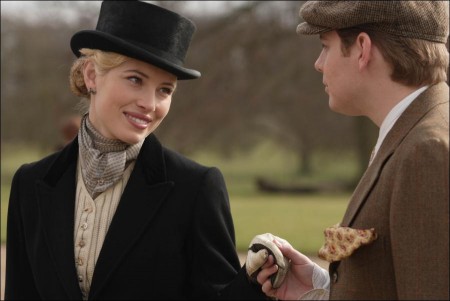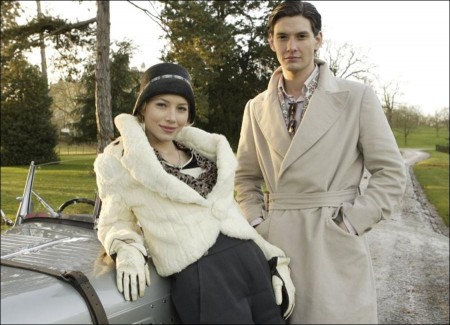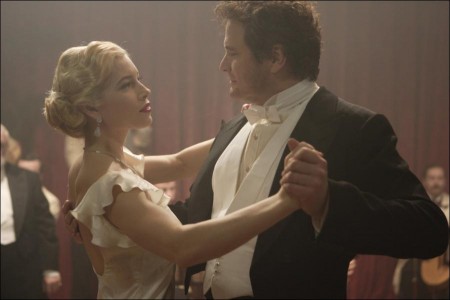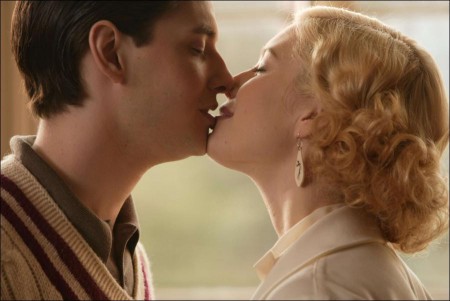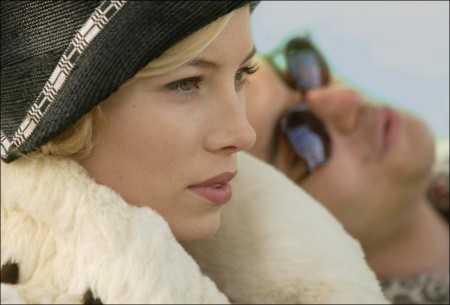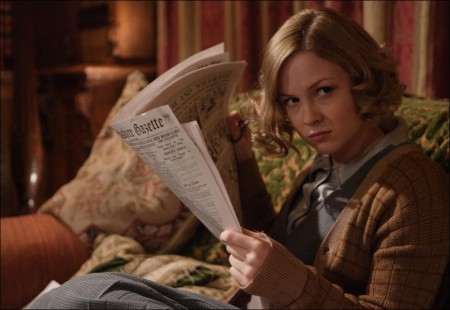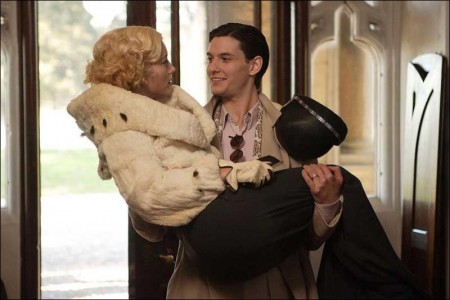Background
It’s discouraging to think how many people are shocked by honesty and how few by deceit.” (Noel Coward)
Noel Coward wrote ‘Easy Virtue’ in 1924 when he was just 23 and, while it was one of his least known works, it played to considerable success. A young Alfred Hitchcock produced a silent film version of the play in 1928. As a well-known theatre critic once wrote of the production when staged at the Chichester Coward Centenary Festival, “’Easy Virtue’ is a marvellous reminder of Coward’s ability to dynamite from within the high society he is generally assumed to have been celebrating. This is a savage attack on the hypocrisy of the early 1920s and the way in which it used Victorian standards, already outdated by war, to destroy the lives of those it could not control. The result is a psychological study of sexual repression and guilt and revenge, as the old certainties crumble at the advance of the jazz age.”
“I have loved Coward’s work ever since having the good fortune to see Maggie Smith in the 1974 production of PRIVATE LIVES, directed by John Gielgud;” begins producer Joe Abrams, and while Coward is best known for the sophisticated wit and style of his comedies such as PRIVATE LIVES, DESIGN FOR LIVING, and HAY FEVER, it is his dramatic writing that has been the basis of such award winning films as CAVALCADE, IN WHICH WE SERVE, and BRIEF ENCOUNTER. So, EASY VIRTUE was particularly attractive to me, and I was thrilled to be able to acquire the rights
“Obviously none of the wit of Coward’s dialogue could come through in the silent version,? Abrams adds, ?so Hitchcock had to emphasize the drama of the social conflict between the new and the old worlds of 1920?s England. For EASY VIRTUE today, the challenges and opportunities were not just to keep the conflict, but in the spirit of Coward, to build on it with comedy. I approached Barnaby Thompson because of his terrific work on two Oscar Wilde films, and was delighted that he shared my enthusiasm for what EASY VIRTUE could be to a modern audience.”
Producer Barnaby Thompson says “There is something very appealing about this story, which I believe is universal. It’s a story about a guy who meets a beautiful woman, they fall in love and marry and he brings her home to meet the family. So far so good you think, but the mother-in-law takes an instant dislike to the girl, and then it is about the sparks that fly thereafter… and we all have mothers-in-law,”
Dealing with the challenge of adapting Coward for modern audiences, Thompson credits co-writers Stephan Elliott and Sheridan Jobbins. “Coward tends to play it very hard and cold, that’s the nature of his comedy, and so the process of the adaptation was to make sure we care about the characters and give it a thoroughly contemporary feel. The significance of the work that was done on the script was to really build up the emotional landscape of the piece, so you realize that at the beginning it’s all fun and there are wonderfully barbed comments being thrown about, but actually it’s about a group of people who are fighting for their lives and it really matters what the outcome is. If the film succeeds, it will be a combination of Noel Coward’s ability of Stephan and Sheridan to make us care about the people themselves.”
Thompson discusses his choice of director: “Stephan is an experienced director, but had been away from the camera for quite a while, and so in a way he brought the kind of enthusiasm of a first-timer, combined with the fact that he has made several successful movies before. I always liked his sense of anarchy, and when I was looking around for someone to do this I just had a yen to have a director who could inject some irreverence, and Stephan came to mind. He brings an interesting and infectious spirit, and that was obvious on set by the way he drove things along, and everyone seemed to have a very good time during the shoot. That speaks well for him.”
“After famously skiing into a mountain in France in 2004 and breaking my back, pelvis and legs, which kept me off my feet for the best part of three years” begins Elliott, “I had a lot of time to think. I had previously decided I had had enough of the film industry. The accident experience gave me the kick-on I needed, and I was trying to think of ideas when Barnaby presented me with Noel Coward. My first thought was ‘why on earth are you bringing me Noel Coward?’ Period films really weren’t for me; I don’t think I have ever sat through an entire period film in my life! But Barnaby said that was exactly the reason he was bringing it to me, and so I read it and thought, OK what’s in this? And that little sense of rebellion that’s in the piece, specifically with a modern girl like Larita being dragged into a period film and slowly going mad… is where I found myself as a writer. I thought, aha, I can actually have some fun with this. Of course I wasn’t allowed to do my standard farting jokes or put men in dresses, they had to restrain me a little,” he says laughing.
“We didn’t want to make a period film,” continues Elliott, “we wanted to make a modern film for modern audiences so we tried to give it a really contemporary voice, then the actors came along and immediately went into Coward mode. And I had to ask them to talk to me as they would normally, so we did eventually find a common voice. Also we have gone completely mad on the music, and we are doing some really extraordinary special effects which we are not used to seeing in a period film. .”
Talking about working with Stephan on the script, co-writer Sheridan Jobbins says: “Stephan is a very funny man. Mischievous. Devious. Mocking and self-deprecating. While Coward is synonymous with wit – he has a reputation for something a little broader! I pointed this out during our initial script conversation (while rolling around laughing and saying things like, ‘What? You? Write Noel Coward?’). It turns out I inadvertently laid down the gauntlet to a man who respects Coward as one of the great 20th century observers. The original stage play is a melodrama, not one of Coward?s signature comedies. When we were first talking about how to find a way into the comedy without being too heavy handed, Stephan paraphrased Coward by saying, ‘Wit is a spice, not a sauce…’ and that lead to the defining style for our screenplay: Never try and out Coward Coward.”
The Cast
Describing the casting process, producer Barnaby Thompson says: “We met Jessica in LA before she came over here. She had never really been to England, she was by herself and it was December in cold and rainy, miserable England – and here was this girl from Colorado and I think she got a real sense of what Larita’s life might be. But she is a fantastic person and there was a very sweet moment when Jessica and Ben met for the first time, and he walked in with a huge bunch of flowers for his wife! And it’s moments like that when you think, yes, this is going to be OK.”
“I think Larita represents everything that is modern and new, particularly as she is American and at that particular time America was really being felt to be a force in the old world,” adds director Stephan Elliott. “I think the Whittaker family, Mrs Whittaker especially, is desperately clinging on to a world that doesn’t really exist anymore. They have this house which is falling into disrepair because they don’t have the money to look after it, or keep the staff that they should; she has a husband who hasn’t really come back from the war, so she has lost him; and she pins all her hopes on the son coming back to help her run the estate and maintain the status quo. Then this bold, gorgeous American girl walks in the room and Mrs. Whittaker sees immediately that this girl is going to take her boy away from her, and he is the one shining light in her life.”
American actress Jessica Biel describes the appeal of working on her first British film: “When I read the script what I liked most was the Noel Coward repartee. There is a very sardonic, witty, sharp dialogue that is fired back and forth and there is so much not being said, with everything bubbling under the surface. All these niceties are coming out, and really they all want to rip each other’s head off,” she laughs. “I found it very exciting as an actress because I really understood Larita and I became that fiery woman. I am not like that as a person: I am a bit more mellow, so it seemed like a really good challenge. Also, I loved the idea of playing an American amidst this whole world I didn’t really understand, like the English traditions and customs; trying to get my head around the English ‘rhyming slang’; doing certain things at certain times and places – and how proper it should all be. It is really funny and helped with that slight feeling of alienation.”
Stephan goes on, “The best thing about Jessica, as per the character, she was a complete fish out of water. She had never done anything like this before, and it must have been pretty terrifying walking into a room and there’s Colin Firth and Kristin Scott Thomas and everyone, and she was so quiet at first I did wonder what I had done.
“Jessica is incredibly unaffected and therefore she is a completely blank canvas and I have never had an actress walk up to me before and say ‘I haven’t a sense of bitterness or cynicism in me’, she said ‘so you have to teach me how to do this’. She genuinely can’t say anything bad about anybody, and believe me I have worked with actors and actresses who can!
Jessica goes on to describe her character: “Basically she is so different from anything the family has ever seen before or ever expected, who has married the golden boy of the family. They are fascinated with her at first, but they don’t understand her and they don’t like her very much. Mrs. Whittaker is very frosty towards her when they first meet and I think she is probably slightly intimidated by her. So from the get-go there are major tensions between the two women. Larita tries very hard to make the tension dissipate and to befriend her mother-in-law, but she is not having it at all.”
As the story unfolds, Larita finds an unlikely ally in Mr. Whittaker: a man who we sense has suffered deeply and withdrawn from his family and apparently, life itself. Whittaker is played by Colin Firth. “The great thing about Colin is that he plays it incredibly real,” producer Thompson says. “You always believe him in whatever part he is playing, and in this film he gives the story real backbone, because he is a man who is still dealing with an enormous amount of pain from the First World War. Similarly he throws out the one-liners with a lovely glint in his eye but there is something about him where he carries his heart on his sleeve and I think that makes him enormously attractive and always gives the piece real muscle, whatever it might be.”
“If I had to describe this family,” begins Firth, “I would have to say it is a dysfunctional aristocratic family when society was still feeling the effects of WWI, and it is probably fair to say that Whittaker is a direct casualty of that; a psychological casualty having been at the front. But everyone else suffered as well and an enormous number of that generation was wiped out and I think you feel it particularly keenly in a rural community. As Whittaker says at one point ‘I am the only man of my age in this village’. So he has isolated himself within the family. He has gone slightly feral; he doesn’t shave; he doesn’t do what he is told or observe the proper protocol. All this is great for me, I don’t have to worry about what I look like in the mornings, I just bowl in importing the bags under the eyes from the night before,” he laughs.
“Whittaker and Larita are both marginalized in the same family,” continues Firth. “She has married into something she doesn’t understand and is shocked to find that suddenly she has no meaningful place in the regime as dictated by Mrs. Whittaker. Whittaker has opted out in a sense and they are both complete misfits in the society. They are both harbouring very different secrets, but they are both enormous burdens to them.”
Colin Firth admits this is not the first role of this kind he has played: “I have had to conform to a mould more than once; public perception doesn’t let you off the hook once they have you pegged. But when Stephan said he couldn’t eat or sleep until I agreed to take the role I was very flattered and just rolled over! But seriously, when I read the script the nuances started to intrigue me, and it all just got the better of me. It was far more interesting and had a lot more meat to it than first met the eye. And when the cast started to come together – a cast this good – I wanted to be in good company and the older I get that becomes more and more the priority,” he laughs.
“Whittaker, as written by Coward, had a scotch and a cigar in his hand and was very ‘rah rah’ and really didn’t go anywhere,” explains Stephan Elliott. “Once we began to think about the characters and really flesh them out, we realized that this man had been through WWI and here he was behaving like he’s at a permanent drinks party! The bottom line is that no one came back from WWI, so we began to adapt that into the character, and he is a pretty broken man and we dealt with that by silence. Which is tough for Colin sometimes, he has a lot of energy, and so for the first time in many, many years, Colin is silent. He brings a stillness, and when he speaks, every word matters. For the first time on camera he lets himself fall apart and of course as the story progresses Jessica’s character brings him back to life. And that is really the arc of the film; it’s about this dead man who meets this girl who slowly brings him back to life.”
Thompson discusses his choice of actress to play the formidable Mrs. Whittaker, a woman desperate to hang on to her family and her values. “I have been ‘in love’ with Kristin Scott Thomas for 20 years now, so any excuse to be in the same room as her, frankly. I wanted her for this ever since I read the play,” reveals Thompson. “We wanted to create a feeling that if things had worked out differently for Mrs. Whittaker – if her husband had come back intact from the war – she could have been Larita. So when Larita walks through the door, she isn’t just seeing an adversary who is going to steal her son, she is seeing someone who has the life she could have had. Kristin is very beautiful and glamorous but was prepared to play against that in this role, so she is much more than just the mother-in-law.”
“Mrs. Whittaker is a very old-fashioned woman,” observes British actress Kristin Scott Thomas. “But she is also very brave, and determined to carry on despite having this massive house that is falling to bits around her. She is horrified that her only son has come home with a very unsuitable, older wife who is threatening to take him away to London thus forcing him to ignore his responsibilities of taking over the running of the house. She feels usurped by this woman and reacts violently towards her. Poor Mrs. Whittaker, I can’t help but sympathise with her but I am not sure anyone else will. She is very bristly and really quite wicked sometimes!”
“Kristin initially resisted this role thinking she had done it all before, and I argued that she had never done this kind of role actually, and worse than that I told her I was going to do to her what I did to Colin. I said ‘I am going to ugly you up,” continues Elliott. “You forget sometimes how incredibly beautiful Kristin is, she really is a stunning beauty, and she would come out of the trailer in her grey wig and these terrible clothes and she would look miserable. So she had a tough time in that first week or so. And then she said ‘you know what, I am going for this’ and then she started having some real fun with it. I think my most favorite piece of direction was screaming at her ‘more Disney witch’ and she burst out laughing and said ‘did he just say that?’“
“Ben Barnes had just completed his role as Prince Caspian when he came to audition and having been extremely impressed with his performance in Stardust last year, I found there was just something about him that shone and sparkled, which is what I think film stars have to do,” says producer Barnaby Thomson. “Obviously he is still young and finding his way, but I do think he has that special ingredient that will make him a big star. We tested him, and he just radiated charm and youthfulness, and he seemed to have a great understanding of the character.”
“When I first read the script,” says Ben, “I really liked the farcical comedy. But it is only there to begin with. Soon it descends into something much darker, so it has very subtle tones to it. I thought the combination of those things would work wonderfully and to have this mad Australian helming the entire thing could only bring an exciting flavour to it,” he laughs.
“The sheer joy of Ben is that he’s a kid at heart,” adds Stephan. “He is an absolute baby and he is not affected, but he’s a kid and has the ability to let that kid go and that was really charming. And up against Jessica playing a 30 year-old there is a lot of sensuality about their scenes together.”
Jessica describes working with Ben: “Working with Ben has been fantastic and we have become really good friends. I think in a way we are both similar in that we are both fairly new to this kind of movie, so we are always trying to find the right tonal balance. We have had some very difficult and emotional scenes, and then by turn some wild comedy moments, and Ben has been a really great ally to bounce ideas around with.“
The family home might be crumbling but they still retain the services of a rather dubious butler named Furber, played by Kris Marshall. Best known for his comedy roles, Marshall embraced the role with gusto. “Furber is quite an odd character to play,” he explains. “There is a bit of mystery about him despite his apparent subservience. As head of the staff he is probably the one who knows more than anyone else what dire straits the family are in and he doesn’t really care. You just know that he is going to ‘do one’ when it all goes pear-shaped, he’s going to get the first train out of there,” he laughs.
While Larita is confronted by the coldness of Mrs. Whittaker, she is initially warmed by the enthusiastic welcome from her youngest sister-in-law Hilda, played by Kimberley Nixon. “Hilda is probably the most annoying little sister you could ever have,” exclaims Kimberley. “She is very childish and completely obsessed with newspaper clippings. So she knows exactly who Larita is having seen pictures of her winning the Grand Prix in Monaco, so her arrival is very exciting! Hilda thinks Larita is the epitome of glamour and beauty, so different from the women she is used to, like her mother and older sister. Larita is a breath of fresh air to this child, but it’s funny how quickly that admiration and sort of infatuation becomes a bit twisted later on in the story,” she laughs.
The other member of the family who appears to accept Larita’s arrival is John’s sister Marion, played by Katherine Parkinson. “I play the eldest daughter,” Katherine begins, “and when I read the script she was described as ‘thick set, with a small crucifix around her neck’. I like to think we have lost the thick set, but she does wear a crucifix,” she laughs. “Actually she is an interesting character because she is ‘religious’ and a total hypocrite. Larita is this wonderful, liberated, emancipated woman, who reads all this saucy literature, like Lady Chatterley’s Lover, then introduces Marion to them, which she takes to voraciously. That kind of hypocrisy is wonderful as she is being pulled in two directions, but I don’t think she thinks for a second that she is being hypocritical as long as she says her prayers!”
The Look of the Period
This period of history saw Amelia Earhart attempt to become the first woman to pilot an aircraft across the Atlantic; Alexander Fleming discovered penicillin; Mickey Mouse appeared in Steamboat Willie, and Flapper dresses and bobbed haircuts were de rigueur. According to award-winning costume designer Charlotte Walter, dressing the characters in EASY VIRTUE was ‘a gift’. A long-time collector of vintage clothing, she explains: “I was very fortunate having such a fantastic cast. Stephan wanted all the costumes in the film to look real and attractive, but not without humour. Kristin was very gratifying to dress and completely understands clothes and style. I based her clothes on the two women in my life who were the most influential, my grandmother and my aunt.
“Colin’s character was ‘shabby chic’, and he too grasped the idea and wore the clothes with just the right attitude. Jessica was the alien arriving in the English countryside from America and Europe, and Steph wanted her to stand out as such. I decided her palette would be black and white, silver, cream and grey – straight angles and no frills or fuss like the art deco of the time – a complete contrast to the greens and browns of the English countryside. She looked so elegant in the clothes and embraced the period feel by bravely wearing 1930s underwear every day even when it was freezing, to get the correct feel and shape or her clothes,” adds Charlotte.
Jessica Biel agrees that the clothing is particularly relevant to the era and was more than delighted with the designs. “My wardrobe on this film has just been amazing. I literally wanted to walk away with every piece! Because Larita is such a modern woman, she is almost ahead of her time. Everything is very streamlined but all of her outfits have a little cheek to them somehow, so for me, wearing the clothes every day really brought her alive.”
“Katherine was my joker card,” continues Charlotte, “she was a delight. All her costumes made me laugh, and they all subtly made her a bit oblivious to her clothes and her mother’s influence. Kimberley Nixon who plays Marion the little sister was also fun to dress. She wanted to look like Larita and break out! Her costumes were pretty but practical and probably hand-me-downs, and then she started to borrow scarves and brooches from Larita.”
When asked to describe the ‘look’ of the film, director of photography Martin Kenzie, says that he and director Stephan Elliott agreed they were going for a very classical look with a modern edge. “We shot it in winter,” explains Kenzie, “and we had some really bright frosty days, which really worked well for us. We also felt that a modern audience wouldn’t necessarily be attracted to this story if we made it as an ordinary romantic comedy, as it were. So we have tried to give it a modern feel with some energetic camera moves while trying to maintain some kind of period look and glossing it to bring it up to date a bit.
Describing Elliott’s directing style, producer Thompson says: “He is very stylish just in terms of the way he moves the camera around, and I think he is quite daring, or cavalier in terms of how he feels something should be caught on film, which immediately liberates you.”
Award-winning hair and make-up supervisor, Jeremy Woodhead talks about the look he tried to create for the characters: “The script was all about contrast and we wanted to heighten the differences between them,” he continues. “For example for someone like Mrs. Whittaker who would never dye her hair, Larita sweeping in with this very fair hair would be such shock to an upper class lady in the shires! Jessica’s hair is naturally brown but we decided collectively that she should be a very obvious blonde with Carole Lombard and Jean Harlow as the reference points. We wanted her to glitter each time she walked into a room,” he says.
Production designer John Beard takes up the story: “Right from the start I was aware that Stephan wanted something slightly quirky in terms of visuals. Both houses, Flintham and Englefield, had real character, and somehow we had to make you believe that all the scenes were taking place in the same house. It was a very good experience for the art department and Stephan was very enthusiastic and great to work with.”
“The one thing about period films is they bore the hell of me,” explains Stephan. “In my head I was thinking I don’t want a museum piece, I want a serious house that looks like it’s in trouble. So I talked to Giles our location manager, and I said I need a house that is falling apart, where every corner is frayed as it is written in the script. As part of the look we took a really ‘30s style to Larita, and when she is in silver and white she looks like the classic ‘30s movie star, stuck on Mars, in this frayed dying old world. And lucky old Jess, she looks a million dollars in every single shot because of what’s around her, and we went to great lengths. Any bright colour that was around her, we got rid of it, so that was the tonal thing…Jessica is an alien arriving from Mars in a silver spaceship and that became a very interesting thing about the colour palette.”
The Locations
EASY VIRTUE was filmed in three magnificent stately homes in the UK which all uniquely reflected aspects of upper middle class life at the time. Flintham Hall in Nottinghamshire acted as the Whittaker house including the fabulous and rare conservatory, described as ‘the finest structure in England still attached to a private house.’ Englefield Hall in Berkshire provided some of the interior shots of the Whittaker family home; and finally, Wimpole Hall in Cambridgeshire was used during the last days of filming as the neighbouring estate, the home of the Hurst family and where they shot the Hunt scenes.
“When I first read the script”, begins location manager Giles Edleston, “I immediately thought of Flintham for the family house. I had known about it for ages, and had been holding back just waiting for the right film; and here it was; it just leapt off the page at me as I was reading the script.” The red brick Grade 1 listed house fitted the story perfectly in that, among its very many unusual and grand features, it boasts a magnificent conservatory, which also served the story perfectly.
The Music
“Musically we are taking a gamble,” says Stephan. “I have never done this before; I am used to scoring a film, and when something sad happens you put some sad music on, for a happy scene you put happy music on…We have recorded all these songs, and sometimes they will come from an old gramophone, and then they will explode into big 5.1 stereo. Finally I decided we had to take one or two gambles, so we are going to record a handful of very contemporary tracks, and re-record them as period. Marius de Vries is our composer, and he did Moulin Rouge so there is a taste of that, but we are taking it one step further.”
“The gamble I think is getting the balance right, between it being of the period of the film and having various cheeky references to more modern cultural things that are anachronistic and doing it in a way that hopefully doesn’t ruffle the surface of the movie too much,” says award-winning de Vries.
“Between Stephan and me, we made a fairly early decision to avoid almost entirely conventional underscore techniques so there isn’t a pretty period piece score underneath it. Almost without exception it’s all scored with songs of the period, or songs that sound as if they come from the period, so to build the musical narrative entirely out of songs is a fresh approach. And allowing the natural liveliness and exuberance of the jazz of the 20s to speak through, and to translate that energy into something that is palpable for a modern audience, without pandering to what might be a superficial need for more contemporary musical signposts,” he explains.
…The Cast Can Sing
Stephan discusses the cast’s musical talents further: “After a few glasses of Ealing?s cheekiest chardonnay, Ben Barnes began to serenade a lovely waitress and accidentally let out his dirty little secret. He?s got one hell of a set of lungs on him. Once I started digging – it just got better n? better. Seems he (almost) represented the UK in the Eurovision Song Contest headlining a boy band called HYRISE (all on You Tube). He quit after one hilarious performance in front of Sir Terry Wogan. That planted a seed in my brain.
During shoot – in a sequence (since cut) I asked Jessica to sing as she dresses for Mrs. Whittaker’s party finale. And out flew another dirty little secret – this one voiced by an angel.
Thought I should try my luck with the rest of the cast. See if I could put a little band together. I started with Colin who nearly tore my head off. Seems little old ladies are stalking him in supermarkets singing MAMMA MIA. So I left it at that.
As I had now talked Ben into singing ROOM WITH A VIEW as John and Larita approach the house for the first time, it seemed criminal not get Jessica in on the act. Having already flown back home end of shoot, I rang her to see how she’d feel about having a crack at the main title track MAD ABOUT THE BOY. And she jumped at it. Seems she wanted to sing all her life – and never been given the opportunity. So she cleared a very busy schedule and flew back just for us to lay the vocal. And we were not disappointed.
Getting right into the spirit – I decided to sing the final reprisal of ROOM WITH A VIEW myself. I?m the second last vocal on the film for those with keen to torture their ears. When Ben found out – he wanted to sing more! How about a duet with his “wife?” Why ever not? The result is a hands-in-the air end title, WHEN THE GOING GETS TOUGH, and I defy anybody to leave a screening of EASY VIRTUE without their feet tapping.”
Production notes provided by Sony Pictures Classics.
Easy Virtue
Starring: Jessica Biel, Ben Barnes, Kristin Scott Thomas, Colin Firth, Kimberley Nixon, Katherine Parkinson, Kris Marshall
Directed by: Stephan Elliott
Screenplay by: Stephan Elliott
Release Date: May 22nd, 2009
MPAA Rating: PG-13 for sexual content, brief partial nudity, and smoking throughout.
Studio: Sony Pictures Classics
Box Office Totals
Domestic: $2,653,621 (15.8%)
Foreign: $14,189,044 (84.2%)
Total: $16,842,665 (Worldwide)
